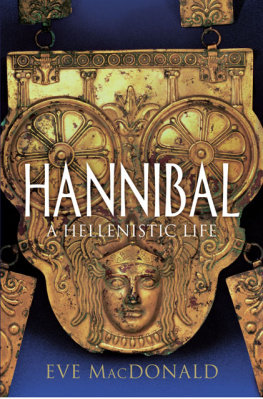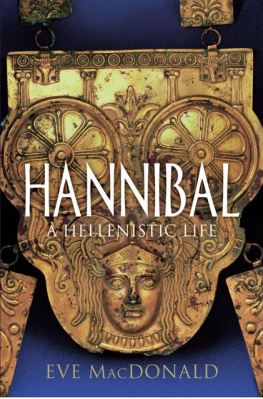HANNIBAL
Other Books By Richard A. Gabriel
Philip II of Macedonia: Greater than Alexander
Thutmose III: The Military Biography of Egypts Greatest Warrior King
Scipio Africanus: Romes Greatest General
The Battle Atlas of Ancient Military History
The Warriors Way: A Treatise on Military Ethics
Muhammad: Islams First Great General
Soldiers Lives Through History
Jesus the Egyptian: The Origins of Christianity and the Psychology of Christ
Empires at War: A Chronological Encyclopedia
Subotai the Valiant: Genghis Khans Greatest General
The Military History of Ancient Israel
The Great Armies of Antiquity
Sebastians Cross
Gods of Our Fathers: The Memory of Egypt in Judaism and Christianity
Warrior Pharaoh: A Chronicle of the Life and Deeds of Thutmose III, Great Lion of Egypt,
Told in His Own Words to Thaneni the Scribe
Great Captains of Antiquity
The Culture of War: Invention and Early Development
The Painful Field: Psychiatric Dimensions of Modern War
No More Heroes: Madness and Psychiatry in War
Military Incompetence: Why the U.S. Military Doesn't Win
To Serve with Honor: A Treatise on Military Ethics and the Way of the Soldier
With Donald Boose jr.
Great Battles of Antiquity: A Strategic and Tactical Guide to Great Battles That Shaped the
Development of War
With Karen S. Metz
A Short History of War: The Evolution of Warfare and Weapons
History of Military Medicine, Vol. 1: From Ancient Times to the Middle Ages
History of Military Medicine, Vol. 2: From the Renaissance Through Modern Times
From Sumer to Rome: The Military Capabilities of Ancient Armies
HANNIBAL
The
Military Biography
of Romes
Greatest Enemy
RICHARD A. GABRIEL

Copyright 2011 by Potomac Books, Inc.
Published in the United States by Potomac Books, Inc. All rights reserved. No part of this book may be reproduced in any manner whatsoever without written permission from the publisher, except in the case of brief quotations embodied in critical articles and reviews.
Library of Congress Cataloging-in-Publication Data
Gabriel, Richard A.
Hannibal : the military biography of Romes greatest enemy / Richard A. Gabriel. 1st ed.
p. cm.
Includes bibliographical references and index.
ISBN 978-1-59797-686-2 (hardcover : alk. paper)
1. Hannibal, 247182 B.C. 2. Hannibal, 247182 B.C.Military leadership. 3. GeneralsTunisiaCarthage (Extinct city)Biography. 4. Punic War, 2nd, 218201 B.C.Campaigns. 5. Carthage (Extinct city)History, Military. I. Title.
DG249.G33 2011
937.04dc22
[B]
2010044562
Printed in the United States of America on acid-free paper that meets the American National Standards Institute Z39-48 Standard.
Potomac Books, Inc.
22841 Quicksilver Drive
Dulles, Virginia 20166
First Edition
10 9 8 7 6 5 4 3 2 1
In Memoriam
Patricia Ann Lake
(19372010)
and
William H. Lake
(19362010)
Sunt Jacrimae rerum et mentem
mortalia tangunt
(These are the tears of things and
our mortality cuts to the heart)
Aeneas
and
For Suzi, always
Contents
Illustrations
Chronology
All dates are before the Common Era (BCE).
814: | Carthage founded on the Tunisian coast as a colony of Tyre. |
753: | Founding of Rome. |
550: | Rise of the Magonid military dynasty in Carthage. |
545: | Rise of Persia weakens the Babylonians hold over Tyre. Sidon eclipses Tyre as the major Phoenician state. Carthage declares itself independent from Tyre, thereby becoming an independent political entity. |
530: | The Persians extend their control westward to Egypt and plan to attack Carthage. Tyre refuses to attack its former colony, and the Persian king calls off the campaign. |
509: | Traditional date of the expulsion of kings from Rome. Also the date of the first treaty between Rome and Carthage recognizing Carthages control of Sardinia and Corsica. |
480: | Carthage invades Sicily with the goal of driving the Greeks from the island. Carthage defeated at Himera and withdraws from Sicily. Carthage turns inward, expands across the African littoral, and rebuilds its economic and military base. The Magonid military dynasty ends. |
409: | Carthage invades Sicily, engaging in a series of wars with the Greeks for control of the island. The Greeks and Carthaginians sign a treaty in 374 delineating their spheres of influence. Carthage occupies the western third of the island. |
348: | Second treaty between Rome and Carthage reaffirming the earlier treaty in which Carthage reasserted its rights to Sardinia. |
310: | Agathocles of Syracuse invades Africa and attacks Carthage. The campaign lasts for three years, but Carthage is not taken. Agathocles returns to Sicily in 307 BCE. |
306: | Rome and Carthage conclude a treaty in which Rome promises to stay out of Sicily and Carthage out of Italy. |
279: | Rome and Carthage sign a military alliance against Pyrrhus of Greece, who attacked Sicily. After three years of campaigning, Pyrrhus withdraws with nothing to show for his efforts. |
275: | Hiero II of Syracuse becomes king of Syracuse. |
264: | The Romans send aid to the Mamertine mercenaries in Sicily. Car-thage moves to suppress the revolt and occupies Messina, causing the outbreak of the First Punic War. |
256: | The Romans invade Africa and threaten Carthage. The following spring Carthage defeats a Roman army under Regulus. The theater of conflict moves to Sicily and the sea. |
249: | Carthage defeats Roman fleets off Drepanum and Cape Pachynus. The Romans respond by constructing a large fleet to fight the Carthaginians at sea. |
247: | Hamilcar Barca, the founder of a new Carthaginian military dynasty, appointed as commanding general of Carthaginian forces in Sicily. His son Hannibal is born. Hamilcar continues to fight the Romans in Sicily for the next five years. |
241: | The Roman fleet defeats the Carthaginians in a great sea battle off the Aegates Islands. Rome and Carthage sign a peace agreement bringing the First Punic War to an end. |
241: | Carthaginian mercenaries, returning from Sicily to Carthage, revolt and cause the outbreak of the Mercenaries War. Hamilcar put in command of Carthaginian forces. |
238: | Hamilcar defeats the mercenaries, ending the Mercenaries War. Hamilcar is again elected general of the Carthaginian armies, and the Barcid military dynasty commands Carthaginian foreign policy. |
237: | The Romans seize Sardinia and threaten to declare war on Carthage, which cedes Sardinia to Rome and agrees to pay an indemnity. Carthage orders Hamilcar to take an army into Spain and establish and expand the Carthaginian economic and military presence there. Nine-year-old Hannibal goes with him. Hamilcars successful expedition lasts nine years. |
231: | The Romans send an embassy to Hamilcar to determine his intentions toward Rome. Hamilcar insists he is only establishing Carthages economic situation to pay the Roman indemnity. |










